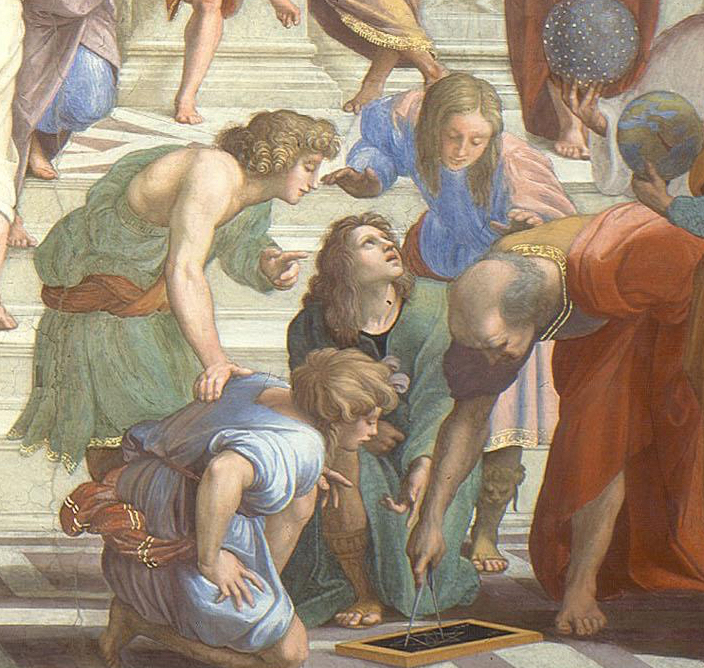Max Beerbohm on Samuel Johnson Laughing
To imagine a scene, however vividly, does not give us the sense of being, or even of having been, present at it. Indeed, the greater the glow of the scene reflected, the sharper is the pang of our realisation that we were not there, and of our annoyance that we weren't. Such a pang comes to me with special force whenever my fancy posts itself outside the Temple's gate in Fleet Street, and there, at a late hour of the night of May 10th, 1773, observes a gigantic old man laughing wildly, but having no one with him to share and aggrandise his emotion. Not that he is alone; but the young man beside him laughs only in politeness and is inwardly puzzled, even shocked. Boswell has a keen, an exquisitely keen, scent for comedy, for the fun that is latent in fine shades of character; but imaginative burlesque, anything that borders on lovely nonsense, he was not formed to savour. All the more does one revel in his account of what led up to the moment when Johnson `to support himself, laid hold of one of the posts at the side of the foot pavement, and sent forth peals so loud that in the silence of the night his voice seemed to resound from Temple Bar to Fleet Ditch.’
No evening ever had an unlikelier ending. The omens were all for gloom. Johnson had gone to dine at General Paoli's, but was so ill that he had to leave before the meal was over. Later he managed to go to Mr. Chambers' rooms in the Temple. `He continued to be very ill' there, but gradually felt better, and `talked with a noble enthusiasm of keeping up the representation of respectable families,' and was great on `the dignity and propriety of male succession.' Among his listeners, as it happened, was a gentleman for whom Mr. Chambers had that day drawn up a will devising his estate to his three sisters. The news of this might have been expected to make Johnson violent in wrath. But no, for some reason he grew violent only in laughter, and insisted thenceforth on calling that gentleman The Testator and chaffing him without mercy. `I daresay he thinks he has done a mighty thing. He won't stay till he gets home to his seat in the country, to produce this wonderful deed: he'll call up the landlord of the first inn on the road; and after a suitable preface upon mortality and the uncertainty of life, will tell him that he should not delay in making his will; and Here, Sir, will he say, is my will, which I have just made, with the assistance of one of the ablest lawyers in the kingdom; and he will read it to him. He believes he has made this will; but he did not make it; you, Chambers, made it for him. I hope you have had more conscience than to make him say "being of sound understanding!" ha, ha, ha! I hope he has left me a legacy. I'd have his will turned into verse, like a ballad.' These flights annoyed Mr. Chambers, and are recorded by Boswell with the apology that he wishes his readers to be `acquainted with the slightest occasional characteristics of so eminent a man.' Certainly, there is nothing ridiculous in the fact of a man making a will. But this is the measure of Johnson's achievement. He had created gloriously much out of nothing at all. There he sat, old and ailing and unencouraged by the company, but soaring higher and higher in absurdity, more and more rejoicing, and still soaring and rejoicing after he had gone out into the night with Boswell, till at last in Fleet Street his paroxysms were too much for him and he could no more. Echoes of that huge laughter come ringing down the ages. But is there also perhaps a note of sadness for us in them? Johnson's endless sociability came of his inherent melancholy: he could not bear to be alone; and his very mirth was but a mode of escape from the dark thoughts within him. Of these the thought of death was the most dreadful to him, and the most insistent. He was for ever wondering how death would come to him, and how he would acquit himself in the extreme moment. A later but not less devoted Anglican, meditating on his own end, wrote in his diary that `to die in church appears to be a great euthanasia, but not,' he quaintly and touchingly added, `at a time to disturb worshippers.' Both the sentiment here expressed and the reservation drawn would have been as characteristic of Johnson as they were of Gladstone. But to die of laughter--this, too, seems to me a great euthanasia; and I think that for Johnson to have died thus, that night in Fleet Street, would have been a grand ending to `a life radically wretched.' Well, he was destined to outlive another decade; and, selfishly, who can wish such a life as his, or such a Life as Boswell's, one jot shorter?
-- From "Laughter," in The Prince of Minor Writers: the Selected Essays of Max Beerbohm

